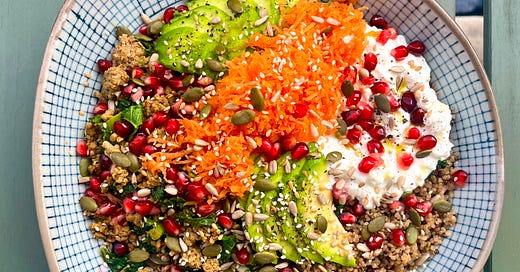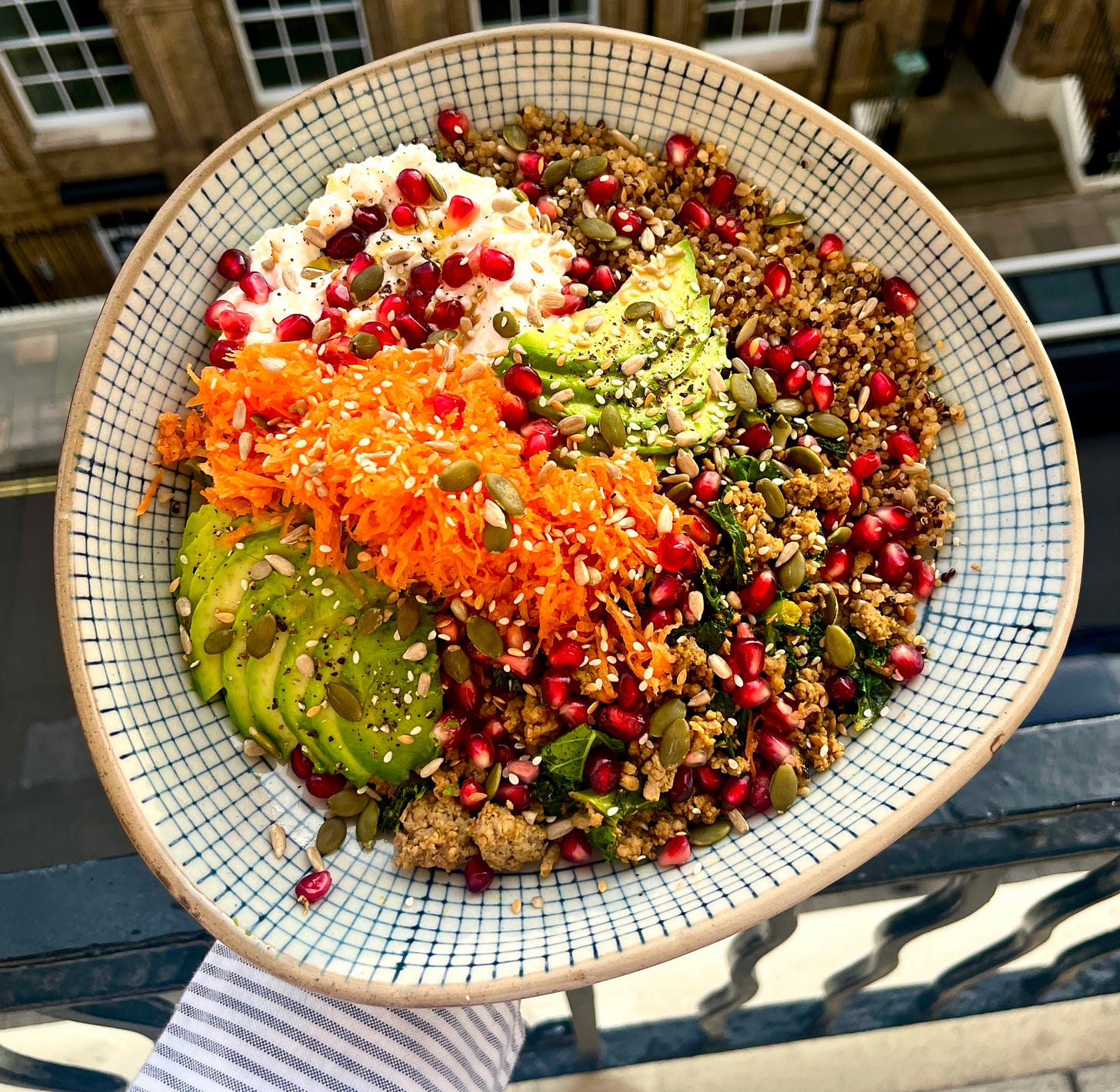I’m not sure if you guys have noticed this or if you pay much attention at all, but when I cook, even when I bake, I do what I can to ensure that everything I put into the meals will be, for the most part, healthy. There are many reasons why I do this, one being that I have a complicated relationship with food, despite my all-encompassing love for it. If I see a bunch of sugar or butter go into something, it’s usually hard for me to feel good about eating it. If I watch only whole and healthy foods go into something, I’ll probably eat it for the next few days. When I cook, I try to cook in a way that makes me feel good about myself, proud of the artistry of the piece and proud of the paint that made it.
A reason for said complication with food is my propensity for feeling and being sick. Like many 21st-century hot girls, digestion is not up there in my strong suits. Many medical tests, trips to the doctor, panic attacks, and an altogether frustration of and with my body have resulted in a near incapability of cooking with trigger foods or foods being tested to see if they make me ill — right now that’s gluten, refined sugar, butter, and raw onion/garlic. Fun, right?
In my journey to try and figure out what is wrong with me (because doctors, as usual, tend to blame it on anxiety), I have taken the liberty to write many assigned and commissioned articles on nutrition. Why? Free appointment with a nutritionist where I can selfishly ask questions about my ailments, then turn them into something that may help others, too.
It is these interviews where I have usually paid the most attention, where I’ve prepared and walked away with my head hitting the floor, heavy with new information, itching to implement it. The one thing that each doctor says is this: your gut is directly communicating with your brain; treat one poorly, and the other will be affected, too. So, if I eat like crap my anxiety is phenomenally impacted and in times of high stress, my body is more than likely going to be more sensitive to what I put into it.
Today I have less than 100 hours left until my final project is to be turned in, my final escapade in academia, the make or break of my distinction, the culmination of five years of higher eduction, the degree that I believed just a year ago was the only viable next step for my career. This is the last week before the rest of my life — the final piece that I will get an email for to indicate that a professor or scholar has deemed it either worthy or unworthy. You probably guessed it; my stomach hurts.
So it is times like these that I employ the knowledge I have both asked for and stolen, and I cook accordingly. Tonight, it is a brain bowl. I often ask experts the best foods for brain power, how to manipulate the motherboard into granting a bright screen more time and energy than should be warranted, how to get the most out of my time at the end of the table, typing, thinking, stressing, enduring. After a long day working toward burnout, and another long one ahead, here’s a plate I recommend you make for the extra push, to soothe the stomach, the nerves, and most specifically, to keep the brain’s wheels well and oiled so they may turn another day.
Brain Bowl!!
Ingredients (and why)
Ground turkey
Lean protein with tryptophan, which helps serotonin production. Serotonin is also a precursor for melatonin, the sleep hormone, so in encouraging serotonin production, you’ll not only have a mood stabiliser, but you’ll also have a more regenerative sleep.
Cottage cheese
High in casein protein, which promotes slow digestion and longer energy peaks without the crash, B12, and calcium, all great for brain function.
Avocado
Good for monounsaturated fats and boosting blood flow to the brain.
Kale (any dark leafy greens)
Vitamin K, lutein, and antioxidants for brain cell protection. Should really eat dark leafys every day to reduce cognitive decline.
Sweet potato and quinoa
Complex carbs keep the brain fueled longer and stabilise blood sugar.
Carrots
Good source of beta-carotene and great for your skin, hair, and nails.
Nuts and seeds (walnuts, pumpkin, chia)
Vitamin E, omega-3s, and zinc all support memory and stress resilience.
Pomegranate seeds
Can help stabilise the stress hormone cortisol and acts as an anti-inflammatory. Rich in polyphenols, which reduce brain inflammation and oxidative stress (linked to brain fog).
Seasoning
Turmeric, cumin, garlic, and black pepper will act as anti-inflammatories.
Dressing
Lemon juice, Dijon, apple cider vinegar, and extra virgin olive oil are healthy fats with extra polyphenols. Honey for the quick energy boost without the blood sugar spike from refined sugar. Soy sauce, because it tastes good.
Side
Kimchi
Staple in my fridge — I usually have it every day, first thing. Rich in probiotics that nourish the gut microbiome, which communicates directly with the brain, regulating mood, anxiety, and mental clarity. Since taking kimchi every day, I have not gotten even an ounce of illness, and my hayfever has subsided, which makes sense because fermented foods like kimchi populate the gut with good bacteria, and 70-80% of your immune system lives in the gut.
Directions (under 30 minutes)
Cook the turkey until browned, then add seasoning, soy sauce, honey, and a whole lot of kale. Cook until wilted and fragrant.
Roast the sweet potato with any spices and a good amount of olive oil.
Plate the bowl over a base of quinoa, topping with turkey, sweet potatoes, cottage cheese, avocado, shaved carrots, pomegranate seeds, nuts and seeds, and any dressing.
So easy, so simple, so good.







